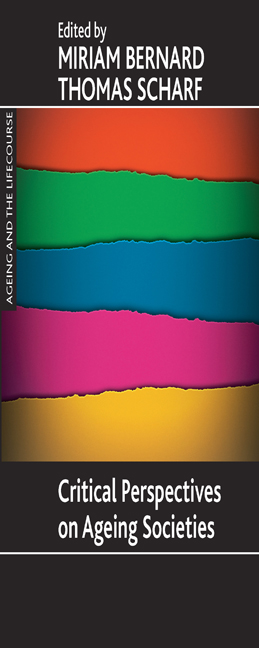Foreword
Published online by Cambridge University Press: 14 January 2022
Summary
Critical gerontology has its roots in the political and economic crisis affecting western societies during the 1970s and 1980s. The nature of this crisis – with major expenditure cuts to welfare programmes – brought profound consequences for the lives of older people. Reductions in the scope and quality of services were one obvious dimension, raising major question marks over the future of the welfare state. Equally damaging, however, was an ideologically driven critique of demographic change, with the labelling of older people as a ‘burden’ and ‘cost’ to society. Both these elements were influential forces behind early formulations of critical gerontology, most notably in the political economy perspective developed by researchers such as Carroll Estes, John Myles, Peter Townsend and Alan Walker. Equally significant, however, was a view that welfare and pension arrangements, as they had evolved over the post-war period, were in some senses de-humanising and demeaning to the experience of growing old. This view was clearly enunciated by Carroll Estes (1979) in her pioneering study on the ‘ageing enterprise’ and was supported by the rise (in the US) of organisations such as the Gray Panthers (led by Maggie Kuhn), together with radical groups of older people in a number of European countries (notably Germany and the UK).
Critical gerontology, from its political economic, feminist and humanist foundations, brought to the study of later life appreciation of the relationship between ageing and economic life, the differential experience of ageing according to social class, gender and ethnicity, and the role of social policy in contributing to the dependent status of older people. Alongside this, however, as many of the contributions in this book make clear, came a commitment to scholarship that ‘gave voice’ to the experiences of older people; an approach as well that placed them as integral to the research process. It is probably fair to say that this perspective was not the dominant approach in the early phases of critical gerontology, when neo-Marxist and structuralist accounts were at their most influential – in the US and UK at least. Moving into the 1990s, however, the importance of older people as agents within gerontology became a point of reference for a variety of studies.
- Type
- Chapter
- Information
- Critical Perspectives on Ageing Societies , pp. vii - viiiPublisher: Bristol University PressPrint publication year: 2007

